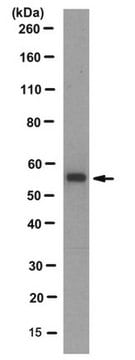PF060
TdT, Calf Thymus
Se connecterpour consulter vos tarifs contractuels et ceux de votre entreprise/organisme
About This Item
Code UNSPSC :
12352202
Nomenclature NACRES :
NA.71
Produits recommandés
Forme
liquid
Niveau de qualité
Ne contient pas
preservative
Fabricant/nom de marque
Calbiochem®
Conditions de stockage
OK to freeze
avoid repeated freeze/thaw cycles
Conditions d'expédition
wet ice
Température de stockage
−20°C
Description générale
Native TdT from calf thymus. Tdt is a DNA polymerase that catalyzes the addition of deoxynucleotides to the 3′ hydroxy terminus of either double of single stranded DNA in a template-independent manner.
Native TdT from calf thymus. Tdt is a DNA polymerase that catalyzes the addition of deoxynucleotides to the 3′ hydroxy terminus of either double of single stranded DNA in a template-independent manner. Although TdT preferentially adds deoxynucleotides to 3′-extensions, tailing onto 5′ overhangs or blunt ended double strands of DNA can also be achieved. TdT can be used for labeling DNA fragments and vectors with homopolymer tails and/or with modified deoxynucleotides such as biotin-dNTPs, 32P-dNTPs, cordycepin-dNTPs, or ddNTP.
The Calbiochem® Terminal deoxynucleotidyl Transferase (TdT) is a DNA polymerase isolated from calf thymus. TdT catalyzes the addition of deoxynucleotides to the 3′-hydroxyl termini of either double or single stranded DNA molecules in a template independent manner. Although TdT preferentially adds deoxynucleotides to 3′-extensions, tailing onto 5′ overhangs or blunt ended double strands of DNA can also be achieved. TdT can be used for labeling DNA fragments and vectors with homopolymer tails and/or with modified deoxynucleotides such as biotin-dNTPs, 32P-dNTPs, cordycepin-dNTPs, or ddNTP.
Application
DNA Labeling
Avertissement
Toxicity: Standard Handling (A)
Définition de l'unité
One unit is the amount of enzyme required to transfer 1 nmol of dAMP from dATP to the 3ʹ-OH terminus of d(A)50 in 60 min at 37°C.
Forme physique
775 Units in 50 mM potassium phosphate buffer, 1 mM B-mercaptoethanol, 50% glycerol, pH 7.2.
Reconstitution
Following initial thaw, aliquot and freeze (-20°C).
Autres remarques
Chang, L.M.S. and F.J. Bollum. 1986. Crit. Rev. Biochem.21, 27.
Deng, G. and R. Wu. 1983. Methods Enzymol. 100, 96.
Michelson, A.M. and S.H. Orkin. 1982. J. Biol. Chem.257, 14773.
Roychoudhury, R. and R. Wu. 1980. Methods Enzymol.65, 43.
Nelson, T. and D. Brutlag. 1979. Methods Enzymol. 68, 41.
Roychoudhury, R., et al. 1976. Nucleic Acids Res.3, 101.
Bollum, F.J. 1974. In The Enzymes, 3rd edition (ed. P.D. Boyer), Vol. 10, 145. Academic Press, New York.
Deng, G. and R. Wu. 1983. Methods Enzymol. 100, 96.
Michelson, A.M. and S.H. Orkin. 1982. J. Biol. Chem.257, 14773.
Roychoudhury, R. and R. Wu. 1980. Methods Enzymol.65, 43.
Nelson, T. and D. Brutlag. 1979. Methods Enzymol. 68, 41.
Roychoudhury, R., et al. 1976. Nucleic Acids Res.3, 101.
Bollum, F.J. 1974. In The Enzymes, 3rd edition (ed. P.D. Boyer), Vol. 10, 145. Academic Press, New York.
Informations légales
CALBIOCHEM is a registered trademark of Merck KGaA, Darmstadt, Germany
Code de la classe de stockage
10 - Combustible liquids
Classe de danger pour l'eau (WGK)
WGK 2
Certificats d'analyse (COA)
Recherchez un Certificats d'analyse (COA) en saisissant le numéro de lot du produit. Les numéros de lot figurent sur l'étiquette du produit après les mots "Lot" ou "Batch".
Déjà en possession de ce produit ?
Retrouvez la documentation relative aux produits que vous avez récemment achetés dans la Bibliothèque de documents.
Notre équipe de scientifiques dispose d'une expérience dans tous les secteurs de la recherche, notamment en sciences de la vie, science des matériaux, synthèse chimique, chromatographie, analyse et dans de nombreux autres domaines..
Contacter notre Service technique







